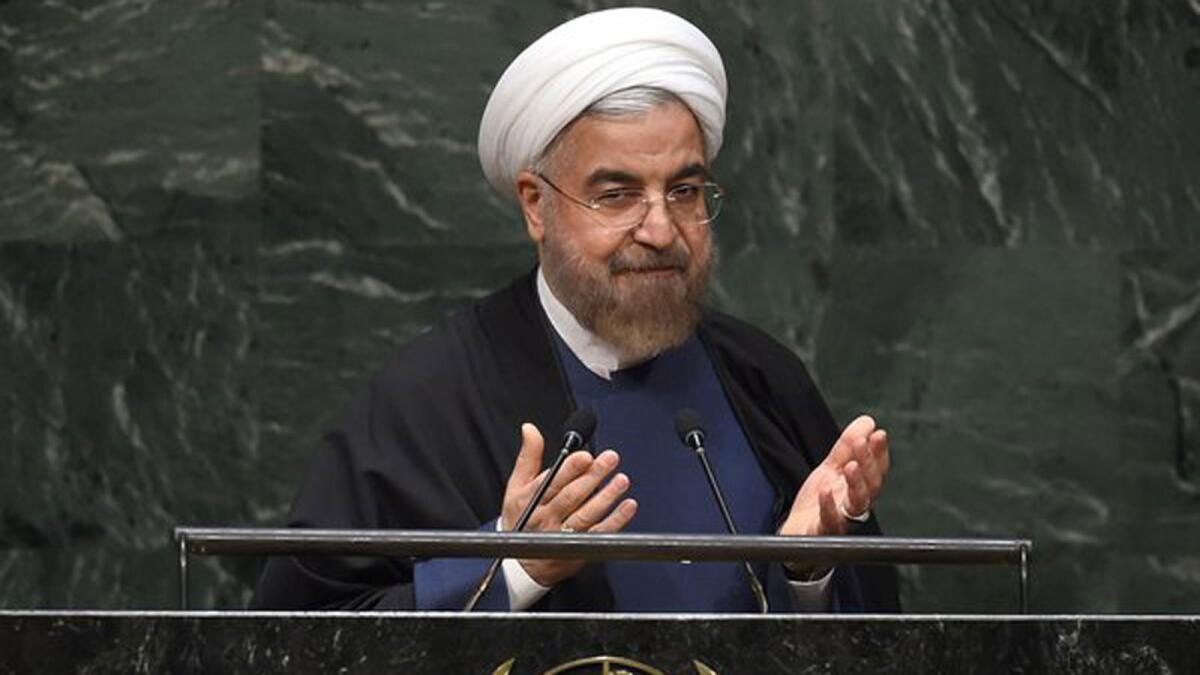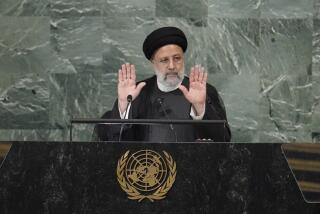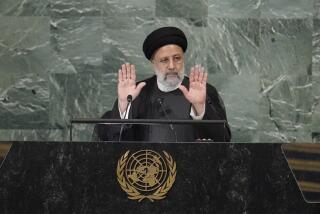Iran’s Rouhani faults West contributing to rise of terrorism

- Share via
Reporting from the United Nations — Iranian President Hassan Rouhani on Thursday accused the West of creating terrorism and mistreating his country, even while promising that Tehran would cooperate on regional issues if the West would accept a compromise deal on Iran’s nuclear program.
In an annual address to the U.N. General Assembly, Rouhani accused the West of unleashing the worldwide threat of groups such as Islamic State through its campaigns against governments in the region.
He also said the West’s sanctions on Iran violate international rules and make it difficult to gain Tehran’s cooperation on common security issues.
But he said Iran continued to negotiate on the nuclear issue in “earnest and good faith.” If an accord can be reached that respects Iran’s rights, there will be an opportunity to begin “multilateral collaboration,” he said.
Many nations in the international community fear Iran is seeking the ability to create nuclear weapons, though Tehran insists that its efforts are for peaceful purposes.
Six major powers -- the United States, Britain, China, France, Germany and Russia -- are in negotiations with Iran to reach an agreement that would rein in its nuclear program while easing international sanctions on the Islamic Republic.
While Rouhani offered compromise and cooperation, his tough tone toward the West on terrorism, the perceived mistreatment of Iran and “Islamophobia” closely follows the views of his country’s supreme leader, Ayatollah Ali Khamenei. Conservatives in Tehran, who worry that Rouhani will go too far with his outreach to the West, probably will find little to quarrel with in the speech.
Rouhani sought in the speech to portray Iran as the reasonable party, open to compromise even while Western governments take a hard line and add new economic penalties. Iranian officials have been positioning themselves to be able to blame any failure in the talks on Western intransigence.
Rouhani said terrorism had its roots in Western colonialism and racism and now menaces countries in the region that have helped fund such groups. He did not name the countries, but apparently was referring to the Sunni Muslim states of the Persian Gulf seen as competitors to Iran, which is dominated by Shiite Muslims.
He contended, again without naming names, that “certain intelligence agencies have put blades in the hands of madmen.”
“Certain states have helped in creating it, and have now failed to withstand it,” he said, calling on those responsible to apologize.
He faulted extremist groups for creating “a fertile ground for further intervention of foreign forces in our region” and questioned the international community’s ability to unite against them.
“The extremists of the world have found each other and have put out the call: ‘Extremists of the world unite.’ But are we united against the extremists?”
He said that the West has unfairly linked violent extremism and Islam, what he said was part of an “Islamophobia project.”
While terrorism has set the Middle East in turmoil, Iran remains one of the region’s most “tranquil, secure and stable” countries, he said. Leadership in combating terrorism should be given to countries such as Iran that are equipped to deal with it, he said.
On the subject of Iran’s nuclear program, he said that a failure of negotiations would not only hurt his nation but other economies in the region. Tehran is pressing for an end to the Western sanctions that prevent it from selling much of its oil.
“Compromise is in the interests of everyone, especially that of nations in the region,” he said.
Follow @richtpau on Twitter for coverage of U.S. foreign policy issues.
More to Read
Sign up for Essential California
The most important California stories and recommendations in your inbox every morning.
You may occasionally receive promotional content from the Los Angeles Times.














